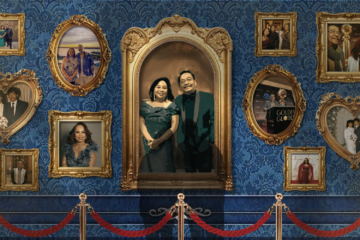
ALTERNATING BETWEEN artifacts and a blackboard, her intentions remain the same—to educate and to dig deep into the world of archaeology.
Under the scorching heat, she is covered in dirt as her hand digs—hoping to find something under the ground. Covered in sweat, Manese smiles with the thought that there is no place she would rather be than the excavation site.
As a part-time history professor at the University, Charlene Manese opens her teaching materials as she remembers her journey in excavation sites in Spain where she honed her knowledge in the field.
With the goal of promoting the importance of culture through the lens of archaeology, Manese’s heart is set to teach history for another day and the coming years.
Refining long roads
Curiosity is a natural feeling Manese always had. This curiosity and sentimental regard for objects are traits she always shared with her mother.
Recalling a time from her childhood, she says, “My mother was always with me, even at school. We know that not every mother is with their child in every activity. I also remember my mother collecting rocks from the freshly emitted volcano [from Mount Pinatubo].”
For Manese, her younger years were the best times in her life because it was filled with moments with her mother.
Initially, her undergraduate course was business administration major in finance and management accounting from Holy Angel University, Pampanga. However, after graduating college, her unsatiated curiosity led her to take up a diploma in archaeological studies at the University of the Philippines Diliman (UP).
Unfortunately, her mother got sick and passed away just a few days before she graduated.
Manese’s shared love for archaeology with her mother is what made her decide to pursue a Master’s degree in the field.
Eventually, Manese’s hard work paid off as she was granted a scholarship in Spain. She soon roamed the hallways of Universidad Pablo de Olavide in Seville as an archaeology and heritage student.

More than Indiana Jones
From climbing mountains and experiencing the complexity of an excavation project, Manese said that her work is often “romanticized.”
She described her experience on an excavation site as “pawis galore (sweaty),” which is different from how movies like Indiana Jones portrayed archaeology.
Manese recounts the obstacles archaeologists had to overcome. Among the setbacks, she said that they often wait for days to get approval from the government, which causes them to arrive late at excavation sites.
However, the biggest lamentation of Manese is the lack of appreciation for archaeology. She is also disappointed that there are still people who undermine her field.
She shares, “My frustration here in The Philippines is the lack of support when it comes to these studies… so therefore there are only a few who take this course.”
Despite everything, Manese still finds joy in her work: “It is difficult, but that difficulty is what gives it excitement. The patience in waiting… [and] when you have discovered something, the moment of victory is sweeter because you’ve waited, you’ve sweat, and you’ve got dirt all over you… therefore, you will appreciate the fruits of your labor more.”
Shackles of COVID-19
Adventures brought by her field constantly give her an adrenaline rush. However, the impact of the COVID-19 pandemic caused heavy setbacks. From being in a site with a significant historical past, she soon found herself enclosed within the four corners of her room.
“Studying archaeology cannot be done these days, especially in the Philippines, because the available digitized archives are not that many. Thankfully in UST there are digitized materials. But for example, for others they need to go to places to get a digitized source,” she says.
Despite the challenges caused by the COVID-19, Manese still finds a way to ignite and preserve the fire.

For the Kapampangans
Manese is a founding member and the current president of the Katipunan da ring Talasaliksik at Talaturung Kapampangan (KATATAGAN). It is a non-profit organization that aims to preserve and promote the Kapampangan culture, history, arts, and language through education.
“I want to build a legacy more on my advocacy [the kapampangan culture]. Here in Pampanga, I can see the love and appreciation of the people for the culture, even though they have not formally studied history in a university,” she says.
Her mission to preserve the Kapampangan identity stays true and grows stronger as time goes by.
“At the end of the day, it is not just about imparting knowledge and transferring information… at the end of the day, you must plant the seeds of care and appreciation for the culture.”
Manese’s passion led her to a place she dreamt of. In the end, Manese hopes for a future where there will be more to pursue her line of work.
“As Filipinos we need to value [archaeology] because it is not just about preserving things from the past, but because it also has an effect for us Filipinos,” she says. F – JAN OLIVER T. MALICSE



